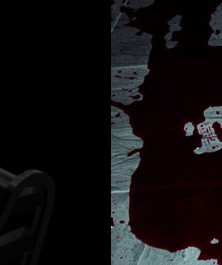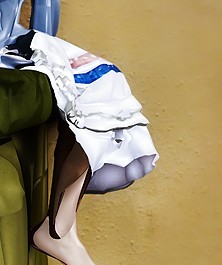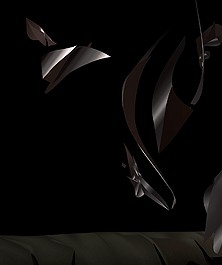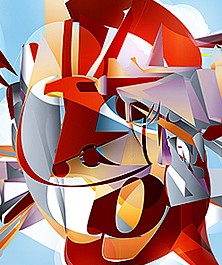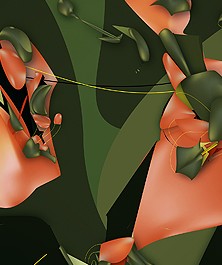Artist Interviews
- XXXI Gabriel Simonds
- XXX Vigan Tafili
- XXIX Parker Gibson
- XXVIII Courtney Wooster
- XXVII Brandon Spahn
- XXVI ricardo juarez
- XXV Daniel Kong
- XXIV Willis Kingery
Spotlight
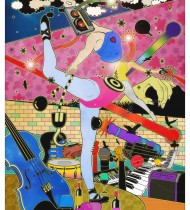 Telequinesis
by Jin
View image
Telequinesis
by Jin
View image Support Evoke
The Interview
Ari Weinkle, also known as Ascend, is a relatively new addition to the Evoke crew. But in the few months he's been with us, he's shown himself to be one of the most versatile and talented artists on the scene. Putting a label on his style is impossible; infinitely adaptable and creative, Ari has earned his spot as featured artist for Evoke's eleventh exhibition in spades. I (Revenant Prime) am honored to bring you this exclusive look into the mind of this creative powerhouse.
Ted Yavuzkurt:
Give me the rundown on yourself - your name, location, hobbies, blah blah you know the drill. And tell me why you chose the alias 'Ascend.'
Ari Weinkle:
My name is Ari Weinkle. I am from Boston, Massachusetts but right now I am at the Rhode Island School of Design in Providence, Rhode Island. I am currently a freshman and am majoring in graphic design. Art is my main hobby, although I also have a huge interest in alternative music. In terms of my alias, "Ascend" I wanted a name that was really unique but at the same time simple. If I had to say why I choose it, it would be because I wanted an upward and positive feeling associated with my name. I try to be optimistic and rise to a new level in my life as best I can, and wanted those qualities to be identified in my artwork.
Ted Yavuzkurt:
Where do you see yourself in 20 years? Idealize your response as much as you want - if everything goes just as you plan what will your future hold?
Ari Weinkle:
Ideally, I would like to become an art director at a large company or design studio in Boston. I'd like to have a nice home and continue to be close to my family and friends. I would also like to have traveled to some exotic places and experienced unique and exciting things. In terms of my art, I'd like to become more conceptual and stretch the bounds of digital art… I can't even imagine what programs or concepts I'll be playing around with at that time but regardless I want to learn and adapt to my environment as I grow older.
Ted Yavuzkurt:
How would you define yourself as an artist? Your style is very distinct yet so dynamic that I am having trouble doing this myself.
Ari Weinkle:
Honestly, I find my style is hard to define as well. Personally, I am not sure I even have a style, just an open mind and a willingness to try new things. If I had to describe my work, I would say that I all my pieces involve some sort of struggle. Right now, I find myself working on an artwork and leaving Photoshop open all time for days at a time. I just open the window whenever I am at my computer. Often times I completely destroy the canvas and mash everything up. It is incredibly frustrating, but I can't seem to produce anything I like in the long term without destroying my baseline concept.
Ted Yavuzkurt:
Where does your inspiration come from? Music? Your surroundings? Other artists?
Ari Weinkle:
All of the above. However, other artists are usually the starting point. I often find something I like in a piece and want to incorporate in my artwork. Usually that starts my mind off on an idea. Then I turn on some music and try to make the concept my own. Over the days or weeks I am working on the piece, my environment definitely shapes how the work comes out.
Ted Yavuzkurt:
When and how did you become interested in art? Did you start out with traditional mediums or did you jump directly into the digital world? Where do you plan to go with your artwork?
Ari Weinkle:
I became interested in art when I was really young. My mom encouraged my creativity and always inspired me to work on pencil drawings and illustrations with her. My dad also took me to a huge amount of museums which opened my eyes to all sorts of art. In high school I took all the two dimensional art courses I could and began expanding my palette. I began making signatures on some forums and that was the gateway into digital art for me. Right now, I have to work in all forms of art including three dimensional design because of the structure of my school. On almost any project I work on I incorporate the computer in the design process. I plan to continue doing this and to become more focused on design and typography as I continue in my artistic career.
Ted Yavuzkurt:
Do you prefer digital or traditional artwork? Or do you think that a blend of both worlds is the best?
Ari Weinkle:
I would have to say a blend. Personally, I dislike painting and am not the strongest draftsman. However, I always find that if I begin my work with a sketch or a traditional collage, the work ends up looking better.
Ted Yavuzkurt:
Is digital art replacing traditional art?
Ari Weinkle:
I think so. However, I don't think there will ever be a replacement for sketching with a piece of charcoal or painting with a brush. I am sure that computers will continue to become more sophisticated but there are just some things that cannot be emulated.
Ted Yavuzkurt:
Do you have any favorite artists or styles?
Ari Weinkle:
In terms of master artists, Picasso, Miro, Dali, Mondrian, Schiele, and Hiroshige are role models in my mind as pioneers of artistic expression and are important to me as an artist. I also deeply respect Da Vinci as a creative powerhouse. My favorite styles are minimalism, modernism, futurism, surrealism, and expressionism.
Ted Yavuzkurt:
I'll admit - I thought our last theme, 'Calligraphy,' would result in a complete lack of submissions, a pack full of typography, or a lot of completely random artwork. Well, artists like you proved me wrong with your versatility. How on earth did you adapt to such a seemingly limiting subject? I have to say that I was impressed - many artists can produce a single type of work (we've all seen the classic "explosion") but few are versatile enough to represent any concept.
Ari Weinkle:
I was definitely intimidated by the theme when I first saw the administrators had chosen it. I was even one of the people who asked to change it. But, as someone who has a love for making logos and working within a specific context, I just tried to extrapolate the concept of calligraphy into a larger framework. For example, I thought of Asian culture or even how calligraphy could be expressed without letterforms.
Ted Yavuzkurt:
Before I get into the nitty-gritty of your artistic process, just tell me what tools you use? Do you use a tablet or any other "hardware" (other than a computer) to do what you do?
Ari Weinkle:
I use a small Wacom tablet occasionally but mainly I use traditional mediums as well as Photoshop and Illustrator.
Ted Yavuzkurt:
What is your "normal" workflow? Do you spend time thinking before starting or do you just dive in? Do you draw concept sketches? Do you jump into detail right away or do you rough out the overall image? In essence, what are the steps you follow - and how long do they take?
Ari Weinkle:
As I said earlier, I usually work out a sketch on paper. Then I start messing around in Photoshop and add details. I leave Photoshop open all the time and check and manipulate things whenever I have a chance. I usually continue this process for at least a week and by the end the week, the work looks nothing like how I pictured or how I initially wanted it to. At that point, I decide whether or not I should continue working on it, or just scrap it.
Ted Yavuzkurt:
When working, what is your state of mind? Do you constantly strategize towards your end goal or do you just "let it flow?"
Ari Weinkle:
Mostly just let it flow. However, right now I am having a problem of adding too much and not having strong enough basic design. I have to question whether elements are necessary and what makes a strong composition the entire time.
Ted Yavuzkurt:
I really enjoyed your work "5 blind." It has a number of Oriental elements as well as calligraphic themes in it - and fits together flawlessly. Can you give me a brief synopsis of how you made this piece from conception to final product?
Ari Weinkle:
Well, I started by looking through some old books in Chinese. I ripped out some pages for the text and then made a collage over the characters. Then I scanned my design in Photoshop and worked on the overall design and added small details and coloring. Then I just continued to work on it for about a week, changing it as I thought fit.
Ted Yavuzkurt:
Alright, we're winding this up so I'm going to start throwing curveballs. Describe the FIRST (don't spend longer than 10 seconds) artwork that comes to mind when you hear the words "mystic," "evoke," and "civilization." (For example, when I hear "mystic" my first thought is a piece with very dark bluish colors and some bright yet ambiguous shapes floating in a circle)
Ari Weinkle:
Mystic: Chinese ink paintings of abstracted landscapes from 9th and 10th century, specifically Early Spring by Guo Xi.
Evoke: The great works by artists on Evoke and all the unique ideas the artists come up with, mainly bright colors and unique ideas.
Civilization: Mondrian and his primary color compositions. They can be read as a guide to the relationship of everything in nature and civilization.
Evoke: The great works by artists on Evoke and all the unique ideas the artists come up with, mainly bright colors and unique ideas.
Civilization: Mondrian and his primary color compositions. They can be read as a guide to the relationship of everything in nature and civilization.
Ted Yavuzkurt:
Ok, now for a question that every artist wants the answer to. How does an artist become creative? Is it an intrinsic quality or is it something one can cultivate?
Ari Weinkle:
In my opinion, creativity is something one can cultivate. Ultimately, I think that if an individual continued to work and practice creating art, they could be just as good as or better than someone that has intrinsic artistic skill and does not choose to work hard.
Ted Yavuzkurt:
Thank you very much for your time Ascend and congratulations on being featured in Evoke's eleventh exhibition - you earned it! Just throw down one last sentence - anything at all - and we're done.
Ari Weinkle:
Thanks a lot! I guess I'll leave you with a quote: "We all know that art is not the truth, art is a lie that makes us realize the truth." - Pablo Picasso

